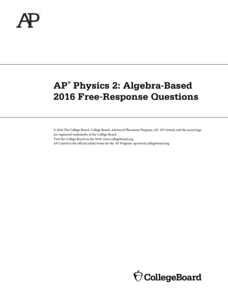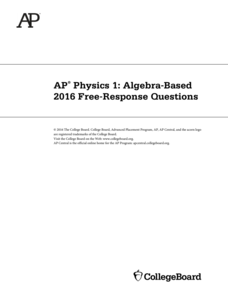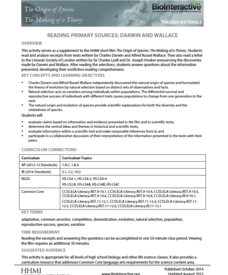College Board
2018 AP® Biology Free-Response Questions
The average AP Biology score dropped in 2018 with the addition of more data tables and graphs. Offer additional practice free-response questions by using the questions from the 2018 AP exam covering phylogenetic trees, cell structure and...
College Board
2015 AP® Physics 2: Algebra-Based Free-Response Questions
As one of the few AP tests that count for second year college course credit, the AP Physics 2 exam requires a higher level of knowledge than most. Help young scientists study for their upcoming AP Physics 2 exams with previous...
College Board
2016 AP® Physics 2: Algebra-Based Free-Response Questions
While AP Physics 1 counts as an introductory college Physics course, AP Physics 2 counts as a second-year college Physics course. Help scholars prepare for this more advanced college-level test with questions from previous assessments...
College Board
2017 AP® Physics 2: Algebra-Based Free-Response Questions
In 2017, more than 15,000 scholars earned college credit based on their AP Physics 2 exam covering lenses, energy, and more. The College Board released the free-response questions, sample answers, and scoring guidelines from that exact...
College Board
2018 AP® Physics 2: Algebra-Based Free-Response Questions
While the AP Physics 2 test maintains the reputation for one of the most difficult AP exams, scholars feel better prepared after practicing free-response questions on currents, conservation of energy, and displacement. The College Board...
College Board
2015 AP® Physics 1 Free-Response Questions
It's rare for even 40 percent of test takers to pass the AP Physics 1 exam. Improve those odds for young scientists with the help of actual free response questions covering topics from free body diagrams to velocity. The College Board...
College Board
2016 AP® Physics 1: Algebra-Based Free-Response Questions
Generally, scholars struggle on the free response portion of the AP Physics 1 exam more than the multiple-choice section. Scholars benefit from additional practice with the help of previous test questions, including questions on forces,...
College Board
2017 AP® Physics 1: Algebra-Based Free-Response Questions
Do you know how to help scholars study for the AP Physics test? Use the free response questions from the 2017 exam covering topics from circuits to waves to prepare pupils for future AP assessments. After answering the questions, read...
College Board
2018 AP® Physics 1: Algebra-Based Free-Response Questions
Whether determining orbitals of space craft or designing experiments with conductive dough, many young scientists discover physics is phun and attempt the AP exam to get college credit. Use the free response questions from the 2018...
Serendip
Genetic Engineering Challenge – How Can Scientists Develop a Type of Rice That Could Prevent Vitamin A Deficiency?
Brown rice contains vitamins B and E, while white rice lasts longer in storage. The availability of rice around the world makes it a great candidate for genetic engineering. Scholars apply their knowledge of genetic engineering to solve...
Serendip
Golden Rice – Evaluating the Pros and Cons
More than half the world's population eats rice as a daily staple ... imagine if that rice could prevent illness. Scientists genetically engineered rice to include vitamin A for just that purpose. However, room for debate still exists....
Princeton University
A Teacher's Guide to the Universe
Astronomers only observe four percent of the universe as the rest hides in darkness. The size, shape, and movement of the universe are the focus for an long-term high school unit. Its 43 lessons include hands-on experiments, direct...
Howard Hughes Medical Institute
Determining the Size and Energy of the K-T Asteroid
Two different groups of scientists published scientific papers in 1980 offering proof of a large asteroid hitting Earth between the Cretaceous and Tertiary layers of ground. Scholars use a worksheet to analyze the same type of data as...
Serendip
Soap Opera Genetics – Genetics to Resolve Family Arguments
Did she cheat on her husband? Did the hospital switch the babies? Should they have children? As much as this sounds like the plot for a soap opera, all of these questions fit into a single lesson on genetics. Scholars read about three...
Howard Hughes Medical Institute
Distribution of Elements in Earth’s Crust
How do scientists know the difference between a meteorite from space and a regular rock from the earth? Scholars read a passage and answer comprehension questions about the creation of the solar system. They extrapolate the main ideas to...
Howard Hughes Medical Institute
Calculating Iridium Fallout from an Asteroid Impact
Should we be afraid of a large asteroid impact on Earth today? Young scientists estimate the size and composition of an asteroid similar to the one that caused the K-T mass extinction. They apply algebraic formulas to answer questions...
Howard Hughes Medical Institute
Reading Primary Sources: Darwin and Wallace
Take your classes back in time. Learners read real historical texts from both Darwin and Wallace as well as an announcement of their findings. Using guiding questions, they make inferences and draw conclusions from the information in the...
Kenan Fellows
An Analytical Chemist, a Biochemist, an Animal Scientist, and an Oncologist Walk into a Lab...No Joke
Oncology presents multiple opportunities for research and the collaboration of many different types of scientists. Scholars divide into groups and research the history of mass spectrometry, polarity/non-polarity,...
Howard Hughes Medical Institute
Alzheimer’s Disease: Piecing Together the Evidence
5.7 million Americans live with Alzheimer's disease. With limited funding for research, where should scientists focus? Young scientists learn about current research and create their own questions. They then decide the best areas to focus...
Towson University
The Wildlife Forensics Lab
Can science put an end to the poaching of endangered species? Show your young forensic experts how biotechnology can help save wildlife through an exciting electrophoresis lab. Grouped pupils analyze shark DNA to determine if it came...
Towson University
Case of the Crown Jewels
Can your biology class crack the Case of the Crown Jewels? Junior forensics experts try their hands at DNA restriction analysis in an exciting lab activity. The lesson introduces the concept of restriction analysis, teaches pipetting and...
Polar Trec
Why Can’t I Eat This Fish?
Can turning on the television lead to toxins in the food supply? The lesson offers an opportunity for young scientists to complete guided research. A worksheet lists each question as well as the web page necessary to answer the question....
Polar Trec
Touring the Poles
Would you want to vacation in the Arctic or Antarctic regions? Scholars research both regions and produce a travel brochure trying to convince tourists to visit. The project focuses on the geography, climate, flora, fauna, and indigenous...
Nature Works Everywhere
Fishing for a Future
Teaching a man to fish has an environmental impact. Through a series of four lessons, learners study the science of fishery management. Their study involves analyzing data to develop a management strategy for specific fish and common...

























